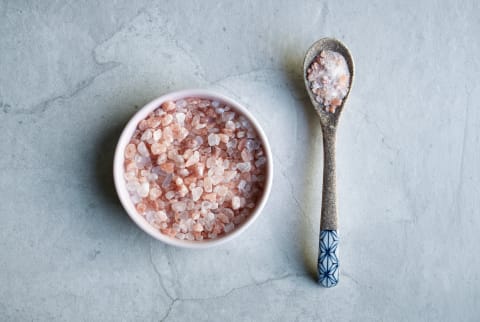Advertisement
This Functional MD Wants You To Transform Your Relationship With Salt


Salt has quite the bad rap. Many associate the mineral with heart disease and stroke—one study even found that reducing salt intake could lower blood pressure1 (which is linked to those aforementioned health concerns). That's why we were stunned to find this little tidbit from Frank Lipman, M.D.'s The New Rules of Aging Well: "It's nonsense that salt is bad for your heart." Quite a bold statement from the functional medicine physician, one that he backs wholeheartedly on the mindbodygreen podcast.
So, why then, do we load on the extra sodium? Below, Lipman tells all.
Here's the skinny on salt.
The reason salt earned its reputation is that it's abundant in ultraprocessed, industrial foods. "That's where most of your salt is," says Lipman. In fact, the American Heart Association (AHA) notes that people consume more than 3,400 milligrams of sodium a day—the recommended amount, for reference, is no more than 2,300 milligrams (mg) a day2—and most of it comes from processed, prepackaged food, not what you sprinkle on at the table.
Since these processed foods are associated with metabolic dysfunction already (which is linked to heart-related concerns), it makes sense that there'd be hesitation about salt. But it's not so much about limiting the salt itself—we should take it easy on the processed junk that contains those waves upon waves of sodium.
"If you're not eating [ultraprocessed foods], having some Himalayan salt is not bad at all," Lipman adds. "Your salt intake is usually too big because of all the processed foods. If you eliminate that, salt becomes a non-issue." Rather, focus on good-quality salt, and he says you're set: Himalayan salt is chock-full of minerals (including iron, zinc, and magnesium3), and Lipman regards sea salt and Redmond salt as high-quality as well. "If you're going to use salt, use decent salt," he adds.
The takeaway.
This doesn't mean you should pour mountains of table salt onto your meals. ("Table salt is not particularly good for you, so why even bother?" says Lipman.) Plus, getting your fill of minerals and nutrients through food alone might nip your salty craving altogether. But if you're partial to a dash or two of good, high-quality Himalayan salt, by all means. When it comes to building a new relationship with the mineral, Lipman says it's time to focus on the quality.